Kristen Lamb's Blog, page 84
March 26, 2013
How Boxing Can Make Us Better Writers—Lesson One

Image via Flikr Creative Commons courtesy of familymwr
Many, many moons ago I was in martial arts (I started Tae Kwon Do when I was 13). Because I’d had roughly eight years of dance, I tended to rely a bit too much on kicks when sparring, and I knew this was a weakness (especially since I was the only female competitor back in those days).
In short, I wanted to get better with my hands. So, when I was 19, I joined a boxing gym. This was 20 years ago, but the lessons learned in the boxing ring are useful for anyone in a creative profession, but particularly writers.
Toughen Your Soft Underbelly
Our profession, by its very nature, is delicate and connected to our soft underbelly (our ego and feelings). Our soft underbelly is exactly where critics will seek to strike.
Think of this job like boxing. We’re in the ring. Outside (and even internal) critics are going to seek to gut-punch and knock the wind out of us. Their objective is to drop us to our knees and make us give up.
These opponents might be nasty reviewers, mean critique group members, jealous people with too much free time, or even family members who will tell you you aren’t a “real writer.”
As a NF expert, I just know to expect the “you are really just a poseur fake and not a ‘real’ expert” jab.
Now, I am human. My first instinct is to raise my shield (my resume, my list of credentials in fiction and social media, my Mom’s sworn testimony that I’m awesome, cute and adorable), but we have to move beyond that and just learn to take the hit and keep moving.
“Roll with the punches,” so to speak.
I recall my first time doing an exercise with the medicine ball. My teammate, a giant black man who was apparently fathered by a Mack truck, stood over me. His job was to toss this “ball” at my stomach as I did my sit-ups. Of course, I just saw a ball, and didn’t put two and two together that this “tiny ball” WAS TWELVE FREAKING POUNDS.
Wasn’t pretty.
I curled over on my side gasping like a goldfish out of its tank, all the while wondering why I didn’t take Jazzercise instead.
Yet, after a few months of this, I swear someone could have hit me in the stomach with a crowbar and it wouldn’t have phased me. It’s because those exercises (which hurt, btw) toughened me up. In short, I learned to take a hit.
In this business, we must learn to take a hit.
Hits Can Reveal Weakness
If someone strikes, and it hurts? That might be an area of weakness we need to actively strengthen. Clearly, if I’d possessed abs of steel when I began this boxing class, the medicine ball wouldn’t have rendered me into a weeping ball of wimpy. Thing was, I hadn’t trained and strengthened that area.
When I was in critique and received a brutal punch to my WIP? It showed my weaknesses. When I was a new writer, I was notorious for overwriting. I never met a metaphor I didn’t love. What did I do? Cry like a sissy little girl?
Yes.
But then I started writing flash fiction to train myself how to employ economy. I wrote flash fiction until I started winning awards and being published in flash fiction. Being forced to cram an entire story into 500 words or less trained me to appreciate that less is often more.
When I wrote my first novel and was bashed by my beta readers for lack of structure? I started reading every book I could find. Scene & Structure, Plot & Structure, Story Engineering, Save the Cat, and The Writer’s Journey are all must-haves. I started working as a line-editor first, then later as a content editor. I’ve critiqued hundreds of plots. I also kept writing until I finally had two novels win major contests.
Even then, I had more to learn. I won because of good stories and witty dialogue, but judges kept telling me that I wasn’t hooking early enough. This led me to Les Edgerton’s Hooked. I started studying beginnings in books and movies. I took classes and soaked up every bit of knowledge possible.
I’m still learning and growing and always will be. My next challenge is to publish my novels. Winning contests is great, but I want that next challenge.
Hits are Valuable
Yes, getting hit sucks and can even make us suck wind; but hits that hurt show us where we need to focus. Hits weed out the uncommitted, those who are in this writing business for the wrong reasons. Hits save time and help ramp us up to the professional level faster. People who can’t take a hit, won’t grow. They won’t know where they are weak and they won’t possess the toughness to endure this profession.
So the next time someone hits you where it hurts? Walk it off and just remember.
It’s all part of going pro  .
.
Has someone hit you where it hurt? What did you do? How did it make you stronger? Did you nearly give up? Why didn’t you?
I love hearing from you!
To prove it and show my love, for the month of March, everyone who leaves a comment I will put your name in a hat. If you comment and link back to my blog on your blog, you get your name in the hat twice. If you leave a comment, and link back to my blog, and mention my book We Are Not Alone in your blog…you get your name in the hat THREE times. What do you win? The unvarnished truth from yours truly.
I will pick a winner once a month and it will be a critique of the first 20 pages of your novel, or your query letter, or your synopsis (5 pages or less) .
And also, winners have a limited time to claim the prize, because what’s happening is there are actually quite a few people who never claim the critique, so I never know if the spam folder ate it or to look for it and then people miss out. I will also give my corporate e-mail to insure we connect and I will only have a week to return the 20 page edit.
At the end of March I will pick a winner for the monthly prize. Good luck!


March 25, 2013
Start in the Action—The Trouble with In Medias Res

Image courtesy of PThread1981 Flikr Creative Commons.
Today, (due to some comments in last week’s posts) we’re going to tackle a highly confusing subject for many writers—In medias res. In medias res quite literally means in the middle of things. This is a literary tactic that has been used since the days of Odysseus. It’s a tactic that forces the writer forward, to begin the story near the heart of the problem.
The Trouble with In Medias Res
Ah, but this is where we writers can get in trouble. I see writers beginning their novels with high-action gun battles, blowing up buildings, a heart-wrenching, gut-twisting scene in a hospital or at a funeral, all in an effort to “hook the reader” by “starting in the middle of the action.” Then when they get dinged/rejected by an agent or editor, they’re confused.
But I started right in the action! What is more “in the action” than a high-speed chase through Rio as a bomb ticks down to the final seconds?
Bear with me a few moments, and I will explain why this is melodrama and not in medias res.
Commercial Fiction Ain’t A Tale of Two Cities
For many centuries, there was a literary tendency to begin “in the early years” leading up to the story problem. Authors would wax on rhapsotic about the setting and spend 10,000 words or more “setting up” the story. The reader was privy to “why such and such character” became a whatever. There was a lot of heavy character development and explaining the why of things.
This, of course was fine, because in the 18th century, no writer was competing with television, movies, Facebook, or Angry Birds.
Thus, if a book was a thousand pages long, it just meant it must have been extra-awesome. Also, authors, back in the day, were often paid by the word, thus there was a lot of incentive to add extra fluff and detail, layer on the subplots and pad the manuscript more than a Freshman term paper. Writing lean hit the author in the piggy bank, so most authors lived by the motto:
No adverb left behind.
Then Hemingway came on the scene and…well, let’s get back to my point.
In medias res was not employed by many early novelists. They started the book when the protagonist was in the womb (being facetious here) and their stories often took on epic proportions.
Modern writers can’t do this. Yes there are exceptions to every rule, so save the comments/e-mails. Just trust me when I say that modern readers have been spoiled by Hollywood and iPhones. They are used to instant gratification, and most modern readers will not give us writers 20,000 words to get the the point.
These days, especially in this current publishing climate, we need to get right into the heart of the action from the get-go. But if “the heart of the action” doesn’t involve a gun battle, funeral or cliffhanging scene, what the heck does it look like?
There Needs to Be Normal World
We have to know who the players are, thus what’s at stake.
Case in point. I just edited some sample pages from a new writer. The story began in a whitewater raft, with a family careening toward the rocks. Well, it took me a half a page to figure out they were in a raft, then an entire page to realize there was more than the protagonist, and two pages to realize it was a family, but then the raft flipped and dumped everyone out, the water hurling them toward the rocks.
I hadn’t spent any time with the characters, so I didn’t care. They had no faces or names so, to me, they were “red shirts.” This wasn’t a story, it was what Les Edgerton calls a bad situation.
Bad situations are not authentic drama.
There Needs to Be a Hint of the Story Problem
In this instance, the writer had a great story idea, but she began right in the river with the family hurdling toward doom. Okay, but we’re too far in. Had the writer started a bit earlier, the story would have been fine. Perhaps we could have had an argument between Mom and Dad as they unloaded the kids and gear from the family mini-van.
Dad says the rapids are only a Category 1 and Mom argues there were flash floods in an area upstream that could affect the water level and intensity of the rapids. She wants to go hiking instead. She doesn’t trust this river to be just a lazy day on the water with the kids, but Dad insists she is just a neurotic worrier.
See how we aren’t yet in the river, but we are tense. We KNOW Mom is right and they shouldn’t go anywhere NEAR that river.
There Needs to Be an Opportunity to Make a Decision that ENDS the Story
Now, we know that family isn’t going to listen to Mom, because then that would be a really short (and sucky) story. But it doesn’t stop us from hoping they will go hiking instead of rafting.
The writer had a good idea for a story, but she started too far into the story.
We don’t need the family waking up, eating breakfast, packing, loading the mini-van, driving to the State Park. That’s too far back. But, if we begin with them in the river, we are too far in. No one will care. We need to begin in medias res. What is the story problem?
The river.
The rapids are much higher than the family realizes, and they’re all in jeopardy. Thus, we need to begin as close to that fateful decision as possible. It could be at the gate, when the ranger warns them of the floods, but Dad really wants to use his new $1500 worth of equipment and thinks they’ll be fine.
Just get as close to that decision as possible, but still give us 1) time to get attached 2) an opportunity to see the story problem 3) a chance for the characters to walk away and end the story.
I hope this helps you understand in medias res a bit better. I know it confused the Charles Dickens out of me for a long time. What are your thoughts? Opinions? How do you figure out your in medias res? Any tricks? Tips?
I love hearing from you!
To prove it and show my love, for the month of March, everyone who leaves a comment I will put your name in a hat. If you comment and link back to my blog on your blog, you get your name in the hat twice. If you leave a comment, and link back to my blog, and mention my book We Are Not Alone in your blog…you get your name in the hat THREE times. What do you win? The unvarnished truth from yours truly.
I will pick a winner once a month and it will be a critique of the first 20 pages of your novel, or your query letter, or your synopsis (5 pages or less) .
And also, winners have a limited time to claim the prize, because what’s happening is there are actually quite a few people who never claim the critique, so I never know if the spam folder ate it or to look for it and then people miss out. I will also give my corporate e-mail to insure we connect and I will only have a week to return the 20 page edit.
At the end of March I will pick a winner for the monthly prize. Good luck!


March 22, 2013
5 Red Flags Your Story Needs Revision

Original image via Jenny Downing Flikr Creative Commons
This week, we’ve talked a lot about some fundamental errors that can weaken the writing. Most all of us make one or more of these errors, especially when we’re new. Hey, that’s called “being NEW.” No one is born with the natural ability to write brilliant, perfect novels coded into their DNA. It takes time and practice, so give yourself permission to make mistakes…then learn, suck it up and back to work.
It writes the words or it gets the hose *pets fluffy white dog*
Today I’m again donning my editor’s hat to give you a peek into what red flags agents (and even readers) see in those first five pages.
Red Flag #1
If Your Novel has More Characters than the Star Wars Prequels, You Might Need Revision
Don’t even get me started about Jar Jar Binks.
Whenever the author takes the time to name a character, that is a subtle clue to the reader that this is a major character and we need to pay attention. Think Hollywood and movies (good ones, NOT the SW prequels). If the credits roll and there is a named character in the credits, then we can rest assured this character had a speaking part.
I did not know this, years ago, and I felt the need to name the pizza guy, the florist, the baker and the candlestick maker. Do NOT do this. When we name characters, it is telling our readers to care. Sort of like animals.
Only name them if you plan on getting us attached.
We do not have to know intimate life details about the waitress, the taxi driver or even the funeral director. Unless the character serves a role—protagonist, antagonist, allies, mentor, love interest, minions, etc.—you really don’t need to give them a name. They are props, not people.
And maybe your book has a large cast; that is okay. Just (as I mentioned on Monday) don’t feel the need to introduce them all at once. If I have to keep up with 10 names on the first page, it’s confusing, ergo annoying. Readers (and agents) will feel the same way.
Red Flag #2
If Your Novel Dumps the Reader Right into Major Action, You Might Need Revision
Oh, there is no newbie blunder I didn’t make.
Lola leaned out over the yawning chasm below, and yelled to Fabio. She needed her twist-ties and lucky purple rabbit’s foot if she ever was going to diffuse the bomb in time. Sweat ran into her eyes as she reached out for Malfio’s hand. They only had minutes before Juliette would be back and then it would all be over for Katy, Skipper and Mitzi.
Okay, I just smashed two into one. Your first question might be, Who the hell are these people? And likely your second question is Why do I care?
We don’t care. We (the readers) aren’t the writer who knows these characters and is vested. On this blog, we’ve discussed before how Normal World plays a vital role in narrative structure. As an editor, if I see the main character sobbing at a funeral or a hospital or hanging over a shark tank by page three, that is a big red flag the writer doesn’t understand narrative structure (or might be trying to “reinvent it”).
Thing is, three-act structure has worked since Aristotle came up with it. There are better uses of time than us trying to totally remake dramatic structure.
It’s like the wheel. Round. It rolls. The wheel works. Don’t mess with the wheel. Don’t mess with narrative structure.
Some other picky no-nos… .
Red Flag #3
Painful and Alien Movement of Body Parts? Time for Revision
Her eyes flew to the other end of the restaurant.
His head followed her across the room.
All I have to say is… “Ouch.”
Make sure your character keeps all body parts attached. Her gaze can follow a person and so can her stare, but if her eyes follow…the carpet gets them fuzzy with dust bunnies and then they don’t slide back in her sockets as easily.
Red Flag #4
Too much Physiology? Time for Revision
Her heart pounded. Her heart hammered. Her pulse beat in her head. Her breath came in choking sobs.
After a page of this? I need a nap. After two pages? I need a drink. We can only take so much heart pounding, thrumming, hammering before we just get worn out. That and I read a lot of entries where the character has her heart hammering so much, I am waiting for her to slip into cardiac arrest at any moment. Ease up on the physiology. Less is often more. Get a copy of The Emotion Thesaurus.
Red Flag #5
Too Many Evil Adverbs? REVISE!
Most of the time, adverbs are a no-no. Find a stronger verb instead of dressing up a weaker choice.
She stood quickly from her chair.
She bolted from her chair.
Also be careful of redundant adverbs.
She whispered quietly…
Um, duh. The verb whisper already tells me the volume level.
She can, however, whisper conspiratorially. Why? Because the adverb isn’t denoting something inherent in the verb. To whisper, by definition is to be quiet BUT not necessarily to conspire. The adverb conspiratorially indicates a certain quality to the whisper.
Avoiding these pitfalls will make for far smoother, cleaner writing and help you more easily spot what and where revision is needed.
Some books to help you clean up your prose and become a master at your craft? Story Engineering by Larry Brooks is a MUST HAVE in your library. I LOVE ANYTHING written by James Scott Bell, but my favorite is probably Plot & Structure. Hooked by Les Edgerton. Save the Cat by Blake Snyder. Buy these and study them.
You will thank me later.
What are some troubles you guys have? Maybe some questions you want me to address? Throw them up here. Takes a load off my brain so I don’t have to think this stuff up all by myself. Any tips, suggestions, books you recommend we read? Did this blog help you? Confuse you?
I love hearing from you!
To prove it and show my love, for the month of March, everyone who leaves a comment I will put your name in a hat. If you comment and link back to my blog on your blog, you get your name in the hat twice. If you leave a comment, and link back to my blog, and mention my book We Are Not Alone in your blog…you get your name in the hat THREE times. What do you win? The unvarnished truth from yours truly.
I will pick a winner once a month and it will be a critique of the first 20 pages of your novel, or your query letter, or your synopsis (5 pages or less) .
And also, winners have a limited time to claim the prize, because what’s happening is there are actually quite a few people who never claim the critique, so I never know if the spam folder ate it or to look for it and then people miss out. I will also give my corporate e-mail to insure we connect and I will only have a week to return the 20 page edit.
At the end of March I will pick a winner for the monthly prize. Good luck!


March 21, 2013
Shakespeare Wrote Commercial Fiction–The Battle Between Literary & Commercial Fiction

Image via Wikimedia Commons (Source The Washington Times)
In the last post, we had a little bit of a debate about literary fiction versus commercial fiction in the comments, thus I wanted to take a moment to point out something very important. Just because fiction is commercial, doesn’t mean it’s the equivalent of Transformers Part 5. Commercial fiction runs the gambit from fluff that is just there for fun entertainment to multi-dimensional, powerful writing.
I want to point out that Shakespeare’s works were all commercial fiction. His plays were written to entertain regular, illiterate working people. BUT, why his works were so brilliant was that they were multi-layered, threaded with nuance, symbolism, and powerful themes. His work could be understood and enjoyed by “common” people, but there were references that captivated, challenged, and even upset the highly educated.
We still study Shakespeare to this day. Just because our work is “commercial” doesn’t mean it’s plebeian. Conversely, just because a work is loaded with fancy words and references that only a PhD can understand, doesn’t make it good literary writing.
Um, The Canterbury Tales were also “commercial fiction”  .
.
Layers and Complexity Make the Difference
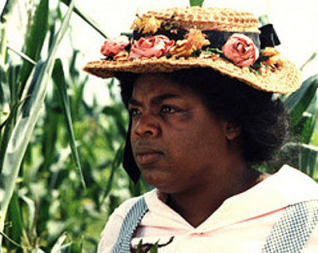
Oprah Winfrey in “The Color Purple”
Joy Luck Club, Winter’s Bone, Lonesome Dove, The Road, The Color Purple, are all good examples of literary works that were multi-layered. I watched Lonesome Dove and enjoyed it when I was 15. Maybe I didn’t catch every reference, theme and nuance my grandparents did, but I could enjoy the story at least on the surface level.
In my opinion, the best literary works are the ones with the skill to entertain all audiences in different ways. But, at least that’s my opinion.
Back to the commercial side…
One of the reasons that Monty Python’s The Holy Grail is one of my all-time favorite movies is because the writers employed the same layers of brilliance. I first saw the movie when I was 5 and laughed at the knights hopping around clacking coconuts. The Black Knight was my favorite. It was basic slapstick even a 5 year-old could find funny.
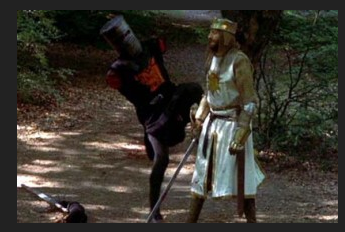
Pansy!
As I grew older and studied more history, more and more references, layers of comedy and double entendres, that, before were hidden, bubbled to the surface. To this day, I still catch new references, making The Holy Grail funnier every time I watch.
Who made you King? I didn’t vote for you. We’re an autonomous collective.
*clutches sides laughing*
Help! Help! I’m being repressed! Come! Come and see the violence inherent in the system!
Thou shall count to three, and the number of the counting shall be three. FIVE? Is RIGHT OUT!
Okay, I’ll stop.
The point I am trying to make here is that literary fiction and commercial fiction are not polar extremes people might believe. Commercial fiction doesn’t automatically mean the fiction is one-dimensional, simplistic and written only for people with an eight grade education or below.
Harry Potter was brilliant in that it could captivate children and adults alike. Rowling’s characters were visceral, complex, and riveting. Winter’s Bone on the literary side, could engage a commercial audience, but those who wanted subtlety, theme and symbol walked away fulfilled.
We Must Look at What We Seek to Accomplish
Goals are goals. Your goals are yours and don’t let anyone belittle those goals. If you want to write commercial fiction that simply entertains and doesn’t take on deep, raw societal issues, that’s a noble goal. If you want to write for the super-educated and challenge the status quo, go for it.
But, I will say that if our goal is to write for a living, to make money, we have to appeal to a larger audience. That’s what will drive sales. If we seek to merely win awards and accolades, then write for the PhD audience. Write for people who read The New Yorker. We have to write what we’re called to write.
Dennis Lehane is one of my favorite authors. He had astounding commercial success with Mystic River (nominated for an Academy Award), Gone Baby Gone, and Shutter Island and all these stories were rich, complex and appealing to a wider audience. He made a choice to write some more literary works, and, though they won awards and accolades, they didn’t make the same kind of money.
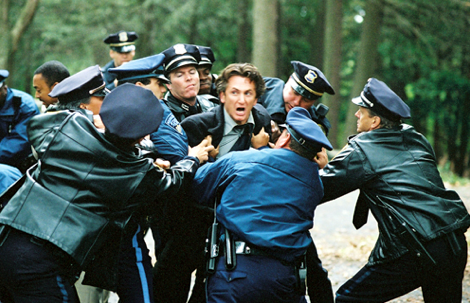
Sean Penn in “Mystic River”
Goals are Critical
But this is why goals are important. What do you want? Books are like food. Want to make big money? Reinvent pizza. Want to make a statement? Experiment with squid and duck livers. Want to do both? Be Julia Child and invite regular people into a world that, previously was inaccessible.
Be a bridge between the extremes. Mystic River is that kind of literary bridge.
In the end, good stories are good stories. Commercial isn’t better than literary and literary isn’t better than commercial. It depends on our goals and what we are called to write. But just because a piece of fiction is loaded with million-dollar words, obscure references and self-indulgent navel-gazing doesn’t mean it’s literary.
On the other hand, just because we want to write stories that entertain millions, doesn’t mean we can’t stretch and add layers of complexity. This is why it is critical to read, explore and learn about craft. My opinion? The true geniuses (literary AND commercial) entertain a wide spectrum, each on their own level.
What are your thoughts? I am no PhD and this is my opinion, so am I off base? What are your thoughts? What are some examples of commercial fiction that was complex? Literary fiction that could be widely enjoyed?
I love hearing from you!
To prove it and show my love, for the month of March, everyone who leaves a comment I will put your name in a hat. If you comment and link back to my blog on your blog, you get your name in the hat twice. If you leave a comment, and link back to my blog, and mention my book We Are Not Alone in your blog…you get your name in the hat THREE times. What do you win? The unvarnished truth from yours truly.
I will pick a winner once a month and it will be a critique of the first 20 pages of your novel, or your query letter, or your synopsis (5 pages or less) .
And also, winners have a limited time to claim the prize, because what’s happening is there are actually quite a few people who never claim the critique, so I never know if the spam folder ate it or to look for it and then people miss out. I will also give my corporate e-mail to insure we connect and I will only have a week to return the 20 page edit.
At the end of March I will pick a winner for the monthly prize. Good luck!


March 20, 2013
How Being Tired Can Make You a Better Writer

Image via Lauriesanders60 WANACommons
One of the best writing teachers/mentors in the business is Author Candace Havens. This woman isn’t an author, she’s a force of nature, and any writer who wants to go pro needs to take her classes. Recently, she presented for us at WANACon, and she brought up some interesting points I’d like to share here.
Embrace Being Tired
Okay, first I want to take a moment to acknowledge that we do need rest. We need breaks and days off. I’ve been working 16 hour days 6 and 7 days a week since the beginning of the year, and right now all I want to do is curl up and sleep…for a month. I’ve wanted to do this for the past 5 weeks at least, but I had to finish what I’d started.
It’s been almost two years since my last social media book, and it was time for a new one. I’d written a 100 page proposal that didn’t go anywhere in the traditional sphere, so at Christmas time, I decided to just dig in and write the book. Obviously, a lot had changed since I’d written the proposal, so basically I was back at square one. But, I set a strict deadline (End of February to finish first draft) and dug in.
Your Body Will Lie to You
Our bodies tend to be a bit lazy, and they like to lie. They tell us we need a day or two or twenty off, and the longer we’re away from the work, the easier it is to let things slip, to see a new shiny and start a newer, more exciting project. In this business, time is our enemy. Always remember this.

Image via JulaiLimjl Flikr Creative Commons
It Will Never Be a “Perfect” Time
We want to wait until we’re rested, the kids are out of the house, until we have total quiet, a new computer, the list goes on. To do this job at a professional level, we have to learn to write no matter what.
I blog every day with a toddler whacking me 47 times with a NERF sword before breakfast, all the while Bubble Guppies blazing in the background. I’ve learned to un-see the dirty dishes, the laundry that needs folding, and the Christmas tree that still needs to be taken down. Yes, I am officially white trash.
Distractions=Death
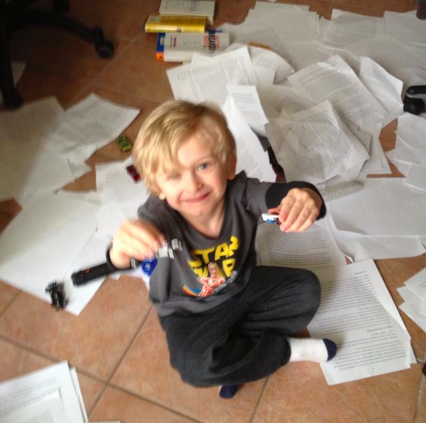
The Spawn “helping me” during revisions. Yes, I wanted to stop and clean the mess, but resisted. Gave me a twitch, but I kept going…
Time is the Enemy
When writing anything (but especially fiction) taking time off can kill momentum. We need to go back, reread, familiarize ourselves with the story and characters (since we’ve slept since that last bit we wrote). This can lead to editing the beginning to death and stalls forward progress. We get bogged down in the first part of the book.
Take too much time? Likely, you’ll have to start all over.
I did. Yes, even NF authors are vulnerable to time.
I spent more effort trying to retrofit work I’d done for my agent back in 2011 than I want to admit. Finally, I just tossed most of the writing and started over. 100 pages of wasted work all because I didn’t keep writing.
My mistake. Won’t happen again.
Sometimes Being Tired Produces Better Writing
I know a lot of you work day jobs, and you’re squeezing in writing when you can. GO YOU! You’re superheroes, and always remember that. Keep pressing.
Yet, one mistake we make is we don’t tackle the novel when we’re tired. We believe our work will be better if we’ve rested.
This isn’t necessarily true.
Candy runs a workshop she calls Fast Draft. In Fast Draft, you write your novel in two weeks. It is one of the toughest challenges I’ve ever done, but it works. No editing, no going back, just keep going forward. By Day Three, I promise you’ll feel like you’ve been tossed in a bag of hammers and shaken.
BUT…
One of the biggest enemies of great fiction is Conscious Mind. Our internal editor lives there and won’t let us move forward until we get rid of “was clusters” or add more detail to that “jungle scene.” Conscious Mind will have you “being responsible” and browsing the Internet looking at South American plants instead of writing.
Conscious Mind is the Bigger Sibling Who Constantly Calls Little Sister (Subconscious Mind) Stupid and Tells Her to Shut Up

Image via Life Mental health Flikr Creative Commons
Subconscious Mind is the primal mind. It sees things we don’t, makes connections Conscious Mind, also known as “The Thinking Brain”, misses. Thinking Brain is a bit of a Bossy Pants and likes to shove Subconscious Mind around, give it wedgies and promise that it can jump off the roof with an umbrella and float down.
Hey, Penguin does it all the time.
The best way to get your Subconscious Mind to help you is to wear the bigger, bossier sibling out. This allows the Little Guy an opportunity to help you make magic without the bigger sibling butting in.
Conscious Mind is the Inner Editor, the Inner Critic, the Nit-Picker, whereas the Subconscious Mind (the Limbic and “primitive” brain) is the one who sees value in finger painting and advantages of glitter.
Subconscious Mind will thrust you deeper into the story. Subconscious Mind is like a toddler who jumps head-first off the couch. No fear. There will be greater emotion and the writing often is more visceral. Subconscious Mind plants Seeds of Awesomeness that you will see flower into something more amazing that you believed you were capable of.
But that won’t happen unless Conscious Mind is exhausted and too tired to argue and bully it’s littler sibling.
So if you’re struggling with the WIP, you might just be a little “too rested.” This isn’t to say we don’t take care of ourselves, but total immersion and pressing on even when we’re worn out and would trade everything we own for a nap does have major advantages.
Have you ever done a fast draft? Did it help? Do you write even when you’re tired? What has that shown you? What are your thoughts? Questions? War stories?
I love hearing from you!
To prove it and show my love, for the month of March, everyone who leaves a comment I will put your name in a hat. If you comment and link back to my blog on your blog, you get your name in the hat twice. If you leave a comment, and link back to my blog, and mention my book We Are Not Alone in your blog…you get your name in the hat THREE times. What do you win? The unvarnished truth from yours truly.
I will pick a winner once a month and it will be a critique of the first 20 pages of your novel, or your query letter, or your synopsis (5 pages or less) .
And also, winners have a limited time to claim the prize, because what’s happening is there are actually quite a few people who never claim the critique, so I never know if the spam folder ate it or to look for it and then people miss out. I will also give my corporate e-mail to insure we connect and I will only have a week to return the 20 page edit.
At the end of March I will pick a winner for the monthly prize. Good luck!


March 19, 2013
5 Common Mistakes that Will KILL Your Novel

Our Novel. Rest in Peace….
Image via Debbie Johansson WANA Commons
Yesterday, we discussed the often confused Man verses Self by using the movie Flight. All good Men versus Self stories still have an outside antagonist that generates the story problem in need of resolution by Act III. No outside antagonist? No story problem? Then the novel quickly devolves into pages of navel-gazing.
Literary Fiction Doesn’t Give us a Pass from Plotting
Look to all the top literary fiction and all of them have an outside antagonist that generates tension, conflict and change. The only difference in literary fiction is that the character arc usually takes a higher precedence than the plot arc.
The plot and story problems are there, but they’re purpose is to force internal change.
Some Examples…
In Brave New World, protagonist Bernard Marx doesn’t fit the mold he was engineered to fill. The society around him lacks meaning and he travels to the reservations (of the “uncivilized” American Indians) for answers. There is a lot of push-back from the society he’s questioning, namely The Director of Hatcheries, and that generates the tension and stakes.
In Catch 22 protagonist Yossarian is creative in his efforts to save his tail from dying in war. The problem? The antagonist, Colonel Cathart, keeps raising the number of missions the men must fly in order to complete their service.
Even literary fiction involves some outside force that is causing the contemplation, depression, rebellion, etc. Whether it is the decline of the aristocracy and rise of the middle class as in Proust’s In Search of Lost Time or implosion of society, and humans-turned-cannibals in Cormac McCarthy’s Pultizer-winning The Road, we must always have an outside pressure and antagonists to drive the story momentum.
Though I will say Proust is from another time (not to mention absurdly self-indulgent), and modern audiences would probably want to pelt him with Angry Birds.
The Case of Commercial Fiction
Most of us, however, write commercial fiction. Thus, the antagonist tends to be a little less on the existential side. Here are five main problems that I regularly see in new writing, regarding the antagonist(s).
#1 No Core Antagonist (No BBT)—This will create, what I call, “the soap opera effect.” Since there is no core story problem, no Big Boss Troublemaker, each scene is just melodrama. Since there is no clear BBT to be defeated, there’s no way to ratchet the tension.
#2 Antagonist is a Caricature—Always remember that the bad guy is the good guy in his own story. One of the best examples of this is in the movie Law Abiding Citizen. The antagonist is a husband whose wife and daughter were brutally raped then butchered and he was left for dead. A flawed justice system basically gave one of the killers a slap on the wrist and now this grieving husband and father wants revenge/justice. It is really hard not to root for “the bad guy” in this movie because we so empathize.
Antagonists who just want to kill or rule the world get boring quickly. Leave the mustache-twirlers to the cartoons.
#3 Antagonist is Weak—The goal of your antagonist should always present BIG stakes for the protagonist. If the goals aren’t strong enough, your story will suffer. What will it cost your protagonist if he/she fails? This is one of the reasons novels based off diaries of something that’s already happened can be weak.
Yes, but they hold the key to her mother’s killer.
All right, but that killer (or people willing to cover the killer’s identity at any cost) better still be alive and the protagonist must be in imminent danger. The diary better be the key to saving her skin and there needs to be more than just a journal. There need to be antagonists standing in her way. When events and bad stuff are in the past? No stakes. Curiosity alone is lousy fuel for stories.
#4 Not Enough Scene Antagonists—Your story needs a core antagonist, yes. But most of the conflict will actually come from allies, love interests and threshold guardians. In Finding Nemo, Darla the Fish-Killer (the BBT) creates the story problem, the abduction of Nemo. She also provides the stakes because she’s known for shaking her fish to death. BUT, we only see her a couple times in the movie. Dori, the fish with memory issues, provides a lion’s share of the conflict that ups the tension, delays the mission and forces Marlin (a control-freak) to change and learn to trust. For more on this, here’s my post.
#5 No Scene Antagonist—Every scene must have an antagonist (dramatic tension). If we have a scene where two characters are simply talking about a third? Info dump, not fiction. Refer to David Mamet’s Letter to the Writers of The Unit:
THE AUDIENCE WILL NOT TUNE IN TO WATCH INFORMATION. YOU WOULDN’T, I WOULDN’T. NO ONE WOULD OR WILL. THE AUDIENCE WILL ONLY TUNE IN AND STAY TUNED TO WATCH DRAMA. ~Mamet
What are your questions, thoughts? Who are some of the best antagonists? Why did you love them? What made them multi-dimensional? What problems are you having?
I love hearing from you!
To prove it and show my love, for the month of March, everyone who leaves a comment I will put your name in a hat. If you comment and link back to my blog on your blog, you get your name in the hat twice. If you leave a comment, and link back to my blog, and mention my book We Are Not Alone in your blog…you get your name in the hat THREE times. What do you win? The unvarnished truth from yours truly.
I will pick a winner once a month and it will be a critique of the first 20 pages of your novel, or your query letter, or your synopsis (5 pages or less) .
And also, winners have a limited time to claim the prize, because what’s happening is there are actually quite a few people who never claim the critique, so I never know if the spam folder ate it or to look for it and then people miss out. I will also give my corporate e-mail to insure we connect and I will only have a week to return the 20 page edit.
At the end of March I will pick a winner for the monthly prize. Good luck!


March 18, 2013
When the Hero is His Own Worst Enemy–What We Can Learn from FLIGHT
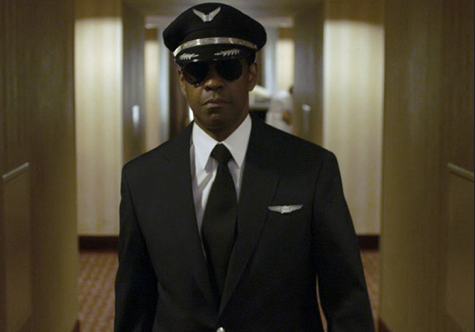
Image courtesy of Paramount Pictures.
One of the biggest mistakes most new writers make is they don’t understand the antagonist and how antagonists are used to drive plot momentum and ratchet up the stakes. Without true antagonists, there is no way to generate dramatic tension. One of the “outs” many writers try to use is “Well, my protagonist is his own worst enemy.”
Yeah, um no. That’s therapy, not fiction.
All stories need two types of antagonists:
The Big Boss Troublemaker
Since the term “antagonist” confuses a lot of new writers, I came up with the term, BBT. If the BBT is something existential (like alcoholism) then it needs to be represented by someone corporeal. In WWII, the Allies weren’t fighting fascism, they fought HITLER. Concepts need a FACE.
Scene Antagonists
Often allies and love interests will provide the scene conflict. Protagonist wants A, but then Ally wants B.
Today, we’ll use a “My protagonist is his own worst enemy” story to prove my point. We are going to talk about the movie Flight. I could write 20,000 words about this movie. It is some of the most brilliant writing I’ve ever seen and Denzel Washington definitely earned the Academy Award nomination for this (he should have won the award, but that’s my POV).
Denzel Washington plays an airline captain who’s somewhat successfully hidden a very dark secret. He’s an alcoholic and drug addict with an ego the size of Mt. Everest. Early in the movie we know alcohol has already cost him dearly. He’s divorced and estranged from his son. Yet, he’s in denial. He’s able to put on a sober, confident face for the world and hide his demons beneath smiles and bravado.
Whip might have continued flying his entire career half-drunk and hopped up on cocaine, except for one problem…he saves a plane full of people from dying and is hailed a hero. When storms, combined with a major mechanical malfunction send his plane hurdling toward certain death, Whip calmly executes maneuvers no other pilot could duplicate, saving all the passengers but four.

Image via Paramount Pictures
We are introduced to the BBT EARLY
This is critical. I read way too many new pieces of writing and, 50 pages later, have no idea what the story problem is. The BBT must appear early. We have to know what the protagonist is up against. In Flight, we see the BBT in the opening scene, the bottles of booze all over the hotel room, the lines of coke Whip snorts before getting ready to fly.
The BBT is clearly addiction. Whip is his own worst enemy.
The Inciting Incident Challenges the BBT. Conflict has a FACE.
Had Whip flown just another routine flight, he would have continued drinking and drugging. Had everyone died in the crash, he never would have had to face his demons. Ah, but he saves the day and is hailed a hero.
Uh oh.
Every crash, by law, is investigated.
When Whip is sent to the hospital, his blood is drawn and it shows that he was practically pickled while flying. Also, later in the investigation, three small empty bottles of vodka are discovered in the crash (bottles he drank right before the crash).
Now we have the core story problem, and the BBT has a face—THOSE RUNNING THE INVESTIGATION.
If there was no investigation into the crash, Whip would not have to change. He wouldn’t have to see the hard truth of what he is…an addict. The crash (and ensuing investigation) creates the story problem and tension mounts as the union, the owner of the airline, the NTSB, and the FAA exert outside pressure.
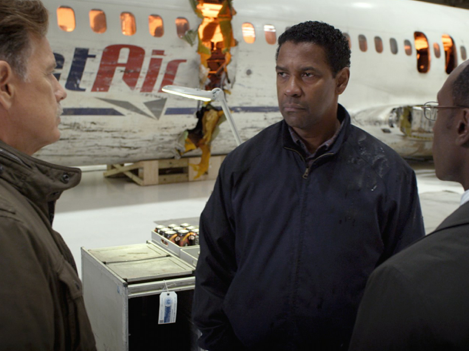
Image courtesy of Paramount Pictures
Make the flaw complicated.
I think what makes Flight a particularly brilliant example is that most everyone knows that, had Whip been sober, he likely would not have been able to successfully execute the daredevil maneuvers that saved the passengers.
Likely it was a mixture of the alcohol that relaxed him combined with the cocaine that heightened his senses that allowed him to save the plane. A sober pilot would have crashed everyone into a fireball of death.
Why is this important? It generates enablers. Whip is pulled between two extremes. One side wants the truth and wants accountability. The other side? They’re willing to turn a blind eye, fudge the truth, and pursue legal loopholes to save Whip from jail time. They are feeding his bloated ego (which is a HUGE source of his problem).
This creates scene antagonists on each side.
Friends are willing to lie for Whip to spare him from jail. Others are offering him a drink or some drugs. These “allies” offer Whip an opportunity to keep self-destructing. Since in these scenes, he’s trying to remain sober, the “friend” offering him a drink is the antagonist.
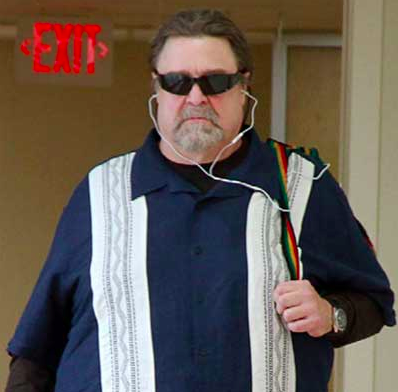
Harling. Image courtesy of Paramount Pictures.
The other side? They want the truth. Where did the vodka bottles come from? Someone needs to answer the unanswered questions and justice needs to be served for the four people who did die. The more questions they ask, the more Whip needs to drink.
His lawyer can’t afford Whip to be seen drunk if he hopes to keep him from going to prison, so he’s working to keep him sober. In these scenes, Whip wants to get blitzed, but his allies won’t let him near the liquor cabinet. Thus, these allies are standing in the way of his goal to drink, which creates tension and makes them antagonists.
His lawyer, girlfriend, and close buddy are all working to keep Whip sober, but as the pressure mounts and the stakes get higher, Whip’s addiction only gets worse. The investigation (story problem) is exerting the pressure that is opening the boil of his flaws.
On the other side, the more Whip self-destructs, the more the enablers step in. His best-buddy Harling is always there with any drug he needs for the situation, any upper or downer Whip requires to maintain the facade that he doesn’t have a problem.
The Protagonist in Act Three MUST Make a Choice
Since the BBT is alcoholism, it MUST be defeated in Act Three by a choice. I won’t tell you that choice, because I wouldn’t want to ruin the movie for those who haven’t seen it yet (I haven’t revealed anything you wouldn’t see in the trailer).
Whip MUST defeat addiction. Question is, “Can he?”
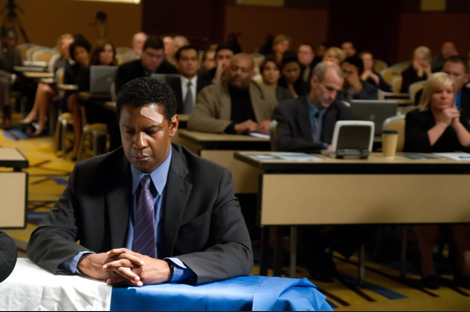
Image courtesy of Paramount Pictures.
His arc is from self-destructive addict in complete denial to someone who takes on his demons, no matter the cost. The ANTAGONIST is the NTSB. No investigation? Life continues as normal. The addict isn’t tossed in the crucible.
What this means is that a character being his or her own worst enemy alone is not enough. There MUST be a story problem that generates the tension and change. With no story problem, there is no way to have dramatic tension. It just becomes a character being TDTL (Too Dumb To Live). We don’t have a novel, we have self-indulgence that will bore readers or irritate them.
What are your thoughts? Can you think of other examples that did the whole “He is his own worst enemy” thing well? What are your questions? Below is the trailer if you haven’t seen the movie. Watch it. Study it. It is sheer brilliance.
I love hearing from you!
To prove it and show my love, for the month of March, everyone who leaves a comment I will put your name in a hat. If you comment and link back to my blog on your blog, you get your name in the hat twice. If you leave a comment, and link back to my blog, and mention my book We Are Not Alone in your blog…you get your name in the hat THREE times. What do you win? The unvarnished truth from yours truly.
I will pick a winner once a month and it will be a critique of the first 20 pages of your novel, or your query letter, or your synopsis (5 pages or less) .
And also, winners have a limited time to claim the prize, because what’s happening is there are actually quite a few people who never claim the critique, so I never know if the spam folder ate it or to look for it and then people miss out. I will also give my corporate e-mail to insure we connect and I will only have a week to return the 20 page edit.
At the end of March I will pick a winner for the monthly prize. Good luck!


March 15, 2013
The Clock is Ticking—5 Tips for Tighter, Cleaner Writing

Image via CellarDoorFilms WANA Commons
Time is our enemy. Most people don’t have enough. This is why our writing must be tight, direct and hook early. Modern audiences have the attention span of a toddler hopped up on 2 liters of Coke. We can’t afford to let them drift.
Drift=Bad juju
I’ve edited countless books, many from new authors. I see a lot of the same errors, and this is to give you a basic guide of what to look for in your writing. Be your own Death Star. Blast away this weak writing so that, once you do hire an editor, it won’t cost nearly as much because the editor won’t spend precious time (charged often by the hour) to note or remove these basic offenses.
Tip #1—Use Other Senses. BTW, Sight is the Weakest
A lot of writers (new ones especially) rely on a lot of description regarding what a character sees, and while this isn’t, per se, wrong it can be overdone. Also, of all the senses, sight is one of the weakest, thus it lacks the power to pull your reader into deep POV (point of view).
Smells are very powerful.
Jane pushed through the heavy steel doors, plunging into the dark hallway of a school no one had stepped foot in since the city shut it down after the fire. The blackened walls and peeling paint testified to the tragedy that took twenty young lives.
Okay, maybe this.
When Jane pushed through the heavy steel doors, an acrid cloud of old smoke mixed with the sickening sweet of cooked flesh met her in the hall. Burned mildew pulsed from the crumbling walls of the ruined school, clear testimony of where the firefighters began their assault on the blaze. Instead of the familiar aroma of cafeteria food and drying finger paint, all Jane could smell was death. It invaded her mouth and clung to her clothes and skin.
Taste is very powerful.
Fifi tucked and rolled as shoe dove out of her captor’s van. The ground came up hard, harder than she expected.
Okay, not bad, but maybe try…
Fifi tucked and rolled as she dove out of her captor’s van. Her face met the ground, hard. At first, all she noticed was the bitterness of grass mixed with sand that crunched against her teeth. A moment later? The taste of old copper pennies gushed into her mouth, making her gag. Blood.
Try to use a combination of all of the senses. To rely solely on what a character sees will keep the reader at a distance. It will make her a mere observer and not a participant.
Tip #2 Don’t Coach the Reader
When we are new, we tend to think through stage direction, and that’s fine, but it doesn’t mean it should end up on the page. Readers aren’t dumb, so we don’t need all the details.
He raised his hand and struck her across the cheek.
Um, duh. We know he raised his hand to strike her. Otherwise, that would be a serious trick. Jedi mind powers, maybe?
He struck her across the cheek. Hard. Stars exploded in her vision.
We don’t need the character to step up on the curb or reach for the door handle. If a character makes it from one room to another, we fill in the missing (and boring) details. We also don’t need cues for emotion.
Tip #3 Don’t State the Obvious
She slammed the door and cursed in anger.
Okay, unless this character has spacial issues and Tourette’s? We know she’s angry. We don’t “need” the “in anger” part. We’re sharp. We get it. Really.
Tip #4 Don’t Introduce Too Many Characters Too Quickly
I can’t tell you how many writing samples I’ve received that make this mistake. If you have ten named characters by page two? I’m done. In life, we can’t keep up with that many names all at once, and, in writing, that doesn’t change. Too many names will confuse us and muddle who the protagonist is. We get lost, so we’re frustrated and we put the book down…or toss it across the room.
Tip #5 No Secret Agents
This error usually goes hand-in-hand with the previous error. We are introduced to who we assume is the protagonist. Also, unless something cues us otherwise, we assume she’s alone. When another character suddenly starts talking?
Jarring.
Also, tell us who this person is in relation to the character. Yes, you (the writer) know who this character is, but we don’t.
Gertrude awoke with a start. Her alarm clock hadn’t gone off, and panic gripped her. This was her first day at the new job, and being late could get her fired before she even started. She nearly fell as she scrambled out of the bed sheets and bolted for the coffee maker.
“I thought you’d be gone by now,” Ted said as he watered his Bonsai trees.
“Me, too. Hey, why didn’t you come wake me up?”
Okay, who is Ted? Brother? Husband? Boyfriend? Friendly home invader? We need to know. Maybe not right away but at least on the same page.
Yet, I see this all the time. A name, some dialogue but no introduction, so no sense of who that character is. We are book-readers not mind-readers.
There are a lot of other ways to tighten the writing, but these are common offenders and a great start. We all do this no matter how many books we write. It’s why we need revision. We can spot this stuff and clean it up and make it presentable for the public.
What are some of your pet peeves? What loses you as a reader? What tips or advice can you share?
I love hearing from you!
To prove it and show my love, for the month of March, everyone who leaves a comment I will put your name in a hat. If you comment and link back to my blog on your blog, you get your name in the hat twice. If you leave a comment, and link back to my blog, and mention my book We Are Not Alone in your blog…you get your name in the hat THREE times. What do you win? The unvarnished truth from yours truly.
I will pick a winner once a month and it will be a critique of the first 20 pages of your novel, or your query letter, or your synopsis (5 pages or less) .
And also, winners have a limited time to claim the prize, because what’s happening is there are actually quite a few people who never claim the critique, so I never know if the spam folder ate it or to look for it and then people miss out. I will also give my corporate e-mail to insure we connect and I will only have a week to return the 20 page edit.
At the end of March I will pick a winner for the monthly prize. Good luck!


March 14, 2013
Can Social Media Tools Make us a Social Tool?

AVOID THE SHINY! (Image via David Kayzer Flikr Creative Commons)
Social Tools can make life a lot easier. I cannot imagine trying to keep up with all the people I follow on Twitter without the aid of TweetDeck or HootSuite. This said, those tools offer some little extras that are enticing, but I am here to warn you to stay away from the shiny.
No Need for Multiple Identities on Twitter
Yes, I know TD and HS allow you to have multiple identities. Don’t go there. You need only ONE identity—the NAME that will be printed on the front of your books. If you can’t get it, be creative. Add a “writer” or “author” in front or behind. Use initials. Add a number, an underscore, or even a state designation. I am @KristenLambTX.
ONE IDENTITY, PLEASE.
Writers complain all the time they don’t have any time for social media, but then they have more personalities than Sybil running around making a mess. We only need to hear from YOU, not your book (we can’t emotionally connect to an inanimate object) and not from your characters.
Remember if we are following you, we might follow the other identities too and then we are just being buried in redundancy.
DO NOT TWEET AS A CHARACTER
Tweeting from the perspectives of characters is a gimmicky time suck that fractures our brand and attention. Additionally, anyone interested in following your characters has likely already bought and read the BOOK. This said, this activity does nothing to gain new readers, and for those of us who haven’t read the book? We have no idea what’s going on. And, once we realize you’re conversing with yourself, it seems creepy and weird.
I know there was a best-selling thriller author who I followed. He was constantly talking to someone from the CIA. This didn’t seem weird because Barry Eisler talks to REAL experts all the time on Twitter. The person this author was talking to had a blacked out picture and a bio, but it really looked like some expert from intelligence who wanted to remain anonymous. Months later, I went to buy the author’s book…only to realize I had been following and talking to his character.
*head desk*
I was mortified, then ticked. I unfollowed both and, needless to say, didn’t buy the book.
Multiple Identities Can Get Us In Trouble
There is no humanly way to keep up with multiple identities AND write books. Often, people who use this tactic, resort to automation. Yeah, we love talking to computers. I call Sprint daily so I don’t feel lonely.
People are on social networks to socialize. If we wanted to buy crap we don’t need, we’d be on the Home Shopping Network, not the social network.
Don’t Make Us “Friends With Benefits”
Automation and preprogramming is taking without giving. We expect others to be present and vested, whereas we are too busy to hang out on Twitter. Thus, what we are telling others is that they are Friends with Benefits. All the benefits of friendship with none of the time and emotional sacrifice.
No we don’t feel used at all.
Automation easily gets out of hand, especially when programmed using hashtags. We had an author coach with four identities (all her picture, but different variations of her name) programmed to blast #MyWANA daily, multiple times a day with slight variations of the same messages. Let’s just say, we didn’t buy her services.
We were too busy looking for digital pitchforks and torches.
Triberr is great if we use it to keep our favorite blogs in one spot. All too often, however, it’s been a major source of link spam. TrueTwit (aptly named) might keep you “safer” from spammers, but it opens anyone who clicks that link to validate they’re human to being phished and hacked.
Note: NOT that hard to unfollow and report a bot. Don’t make people jump through hoops.
Avoid the Allure of Algorithms
Yes, I know fan pages can tell you what you posted what time of day what image recieved the most shares and from where, but ignore this. Are you on Facebook or ovulating? Just talk to people. When we pay too much attention to numbers, we get into gaming behavior. We keep trying to duplicate the “magic” and there is no “magic” to be duplicated. Even if there was magic (which there isn’t), all it takes is a slight “tweaking” of the algorithm to change everything.
Just ask anyone who’s been a member of Klout more than six months.
Social Tools are great, but if we focus too hard? A Social Tool can make us a Social Tool. We spam others and automate and wait until Thursday EST just after lunch to tweet about kittens in league with satan because that seems to get us the most followers.
Ticket to CRAZY TOWN.
No Social Media Day-Trading
The WANA Way is a long-term investment. It’s the 401K filled with mutual funds. Keep adding little by little and one day, you will cash in BIG, but only after investing in people and relationships over a long period of time.
Social Tools are Social Media Day-Trading. We are locked to the numbers and gambling on this behavior or that, or adding more identities to make the numbers look good, and NONE of this will have long-term effect…unless one counts wrinkles, gray hair and a twitch in our left eye.
Use Tools to Build Community
I use HootSuite so I can engage with all kinds of people. If I used regular Twitter, there is NO WAY I could keep up or forge friendships effectively. Just because a tool offers a lot of shinies, doesn’t mean they aren’t a bug writer zapper.
What are your thoughts? Have you had trouble with tools? What ways to you use them effectively without devolving into a bot?
I love hearing from you!
To prove it and show my love, for the month of March, everyone who leaves a comment I will put your name in a hat. If you comment and link back to my blog on your blog, you get your name in the hat twice. If you leave a comment, and link back to my blog, and mention my book We Are Not Alone in your blog…you get your name in the hat THREE times. What do you win? The unvarnished truth from yours truly.
I will pick a winner once a month and it will be a critique of the first 20 pages of your novel, or your query letter, or your synopsis (5 pages or less) .
And also, winners have a limited time to claim the prize, because what’s happening is there are actually quite a few people who never claim the critique, so I never know if the spam folder ate it or to look for it and then people miss out. I will also give my corporate e-mail to insure we connect and I will only have a week to return the 20 page edit.
At the end of March I will pick a winner for the monthly prize. Good luck!


March 13, 2013
Do You Have a Psychic Vampire Critique Partner?

WHAT do you MEAN I am head-hopping? THAT is my VOICE. You are ruining my ART!
(Image via Carniphage Flikr Commons)
In the beginning of my Enemies of the Art series, we discussed Psychic Vampires. Psychic Vampires are all around us, and likely, we will never be rid of them. PVs are most likely to show up at a number of critical junctures. They sense the energy shift, and since that energy is no longer all about them, they will fight tooth-and-nail to bring balance to The Force (of Manipulation).
While many of my posts are directed toward writers, most people have these same issues. If we don’t learn how to guard against and handle PVs, we will always be their victims. Psychic Vampires will always feel renewed and refreshed, namely because they just sucked the life out of their victims (us).
Psychic Vampires abound in the arts, and they’re also prevalent in many writing groups. They are vamps dressed in writer clothing. Often they are so self-absorbed they can’t even see the reality of what they are.
This is why confronting PVs is almost always fruitless and will simply lead to conflict that only further feeds them at our expense. Our best option is to be able to spot them, then ignore them or RUN.
Beware the Psychic Vampire Critique Partner
I wish I could give all of you a nice, easy website to find healthy, professional critique partners, but unfortunately those don’t exist. We will have to trust, then use trial and error, then set tough boundaries. Some CPs will make it, but likely most will not.
Why?
Too many writers get into this business for the wrong reasons. They really aren’t interested in the life of a professional and just enjoy “playing author.” Writing is for attention and ego-stroking. Their goals are about THEM and this means anyone on board with them will go the wrong direction.
They will keep steering the ship the wrong way…toward the rocks.
Some PVCPs are touchy, sensitive and unwilling to learn and grow. Mistakenly, they believe that their art is just genetically coded into their DNA and that any feedback is just trying to sabotage their “art.”
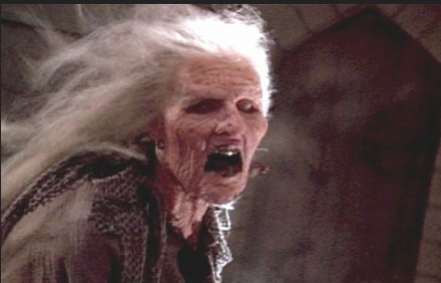
What do you mean too many flashbacks? YOU ARE SO MEAAAANNNN!
If you have a critique partner who refuses to listen to honest feedback. If she is touchy and oversensitive? Move on. You won’t grow. You’ll spend too much time propping up an ego that can never get enough propping up. The PV will be a continual vortex of need and if you don’t jump ship while you can? Expect to crash on the rocks with them.
This writer won’t make it unless she changes, and if you’re enabling her to be a PVCP, why should she?
We Are Who We Hang Around
I cannot recommend attending writing conferences enough. Yes, even WANACon counts. The reason? These writers have invested cold hard cash into getting better. When we forge relationships with writers who are professional or stronger, we grow. Water will always find its level, so make sure you’re rising, not sinking. Habits are contagious. This is one of the reasons I cannot recommend joining an RWA chapter enough (even if you don’t write romance).
RWA is full of professionals who work their tails off and understand craft and the business. As iron sharpens iron, so one man sharpens the other. Refuse to be in a place that dulls your creative edges.
PVCPs Waste Valuable Time
I’ve been in critique relationships where the other person never learned to think for themselves. Why bother reading Story Engineering, The Writer’s Journey, Hooked, Save the Cat or Plot & Structure when we can get Kristen to so all our thinking/plotting for us?
I recall two members of a critique group who attended every week with their crappy writing to be critiqued. Instead of learning, they just barfed down junk on a page and let the group “fix” it. Odd thing was, after over a year of enduring the world’s worst writing, nothing changed. When these individuals self-published? NONE of the writing had changed.
This ticked me off. How many hours had we dedicated to helping, when the writer had zero intention of listening? The critique wasn’t a place to grow; rather, it was a captive audience who had to listen to their dreadful “story” vomit.
Most of us are short on time. We often have day jobs, kids, chores, bills and we have to do social media and MOST IMPORTANTLY we need to be writing more books and better books. It’s easier to tread water if we aren’t dragging a PVCP anchor around our necks.
The PVCP Test
1. Is the writer touchy. Does she want every bit of feedback to be handed with a box of chocolates?
2. Does she attend regularly? Or does she always have an excuse of why she can’t be there—great-nephew’s birthday party, helping a friend’s garage sale, washing her hair?
3. Does the writer actually READ? Does she read fiction and LOVE storytelling? I’ve met writers who claimed they wanted to be NYTBSAs, but said things like, “Well, I just don’t like to/have time to read.” Reading is FUNDAMENTAL to what we do. A writer who doesn’t read is like a musician who doesn’t listen to music. TIME WASTER.
4. Does the person give back? Critique partners should be partners. I’ve had writers who took and took for months. They wanted me to plot, then re-plot, then they had a new and BETTER idea they needed “help” plotting. Never once did it occur to them, that we hadn’t talked about my book in months.
5. Does this person ever grow? Or do they keep making the same newbie errors over and over? If they are? They aren’t listening, so move on. This is a PVCP. RUN.
What are your thoughts? Have you been the victim of a PVCP? What did you do? How did you handle it? What are your horror stories? How did you stake the PVCP? What might be some other ways to spot a PVCP? What might be some good resources for finding a good CP? I recommend trying http://www.WANAtribe.com, join RWA or attend conferences. But, maybe you guys have some better suggestions!
BTW, Image number two courtesy of best movie ever Army of Darkness.
I love hearing from you!
To prove it and show my love, for the month of March, everyone who leaves a comment I will put your name in a hat. If you comment and link back to my blog on your blog, you get your name in the hat twice. If you leave a comment, and link back to my blog, and mention my book We Are Not Alone in your blog…you get your name in the hat THREE times. What do you win? The unvarnished truth from yours truly.
I will pick a winner once a month and it will be a critique of the first 20 pages of your novel, or your query letter, or your synopsis (5 pages or less) .
And also, winners have a limited time to claim the prize, because what’s happening is there are actually quite a few people who never claim the critique, so I never know if the spam folder ate it or to look for it and then people miss out. I will also give my corporate e-mail to insure we connect and I will only have a week to return the 20 page edit.
At the end of March I will pick a winner for the monthly prize. Good luck!





